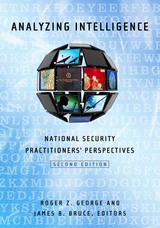
Analyzing Intelligence, now in a revised and extensively updated second edition, assesses the state of the profession of intelligence analysis from the practitioner's point of view. The contributors—most of whom have held senior positions in the US intelligence community—review the evolution of the field, the rise of new challenges, pitfalls in analysis, and the lessons from new training and techniques designed to deal with 21st century national security problems. This second edition updates this indispensable book with new chapters that highlight advances in applying more analytic rigor to analysis, along with expertise-building, training, and professional development. New chapters by practitioners broaden the original volume’s discussion of the analyst-policymaker relationship by addressing analytic support to the military customer as well as by demonstrating how structured analysis can benefit military commanders on the battlefield.
Analyzing Intelligence is written for national security practitioners such as producers and users of intelligence, as well as for scholars and students seeking to understand the nature and role of intelligence analysis, its strengths and weaknesses, and steps that can improve it and lead it to a more recognizable profession.
The most comprehensive and up-to-date volume on professional intelligence analysis as practiced in the US Government, Analyzing Intelligence is essential reading for practitioners and users of intelligence analysis, as well as for students and scholars in security studies and related fields.

Drawing on the individual and collective experience of recognized intelligence experts and scholars in the field, Analyzing Intelligence provides the first comprehensive assessment of the state of intelligence analysis since 9/11. Its in-depth and balanced evaluation of more than fifty years of U.S. analysis includes a critique of why it has under-performed at times. It provides insights regarding the enduring obstacles as well as new challenges of analysis in the post-9/11 world, and suggests innovative ideas for improved analytical methods, training, and structured approaches.
The book's six sections present a coherent plan for improving analysis. Early chapters examine how intelligence analysis has evolved since its origins in the mid-20th century, focusing on traditions, culture, successes, and failures. The middle sections examine how analysis supports the most senior national security and military policymakers and strategists, and how analysts must deal with the perennial challenges of collection, politicization, analytical bias, knowledge building and denial and deception. The final sections of the book propose new ways to address enduring issues in warning analysis, methodology (or "analytical tradecraft") and emerging analytic issues like homeland defense. The book suggests new forms of analytic collaboration in a global intelligence environment, and imperatives for the development of a new profession of intelligence analysis.
Analyzing Intelligence is written for the national security expert who needs to understand the role of intelligence and its strengths and weaknesses. Practicing and future analysts will also find that its attention to the enduring challenges provides useful lessons-learned to guide their own efforts. The innovations section will provoke senior intelligence managers to consider major changes in the way analysis is currently organized and conducted, and the way that analysts are trained and perform.

The intelligence failures exposed by the events of 9/11 and the missing weapons of mass destruction in Iraq have made one thing perfectly clear: change is needed in how the U.S. intelligence community operates. Transforming U.S. Intelligence argues that transforming intelligence requires as much a look to the future as to the past and a focus more on the art and practice of intelligence rather than on its bureaucratic arrangements. In fact, while the recent restructuring, including the creation of the Department of Homeland Security, may solve some problems, it has also created new ones. The authors of this volume agree that transforming policies and practices will be the most effective way to tackle future challenges facing the nation's security.
This volume's contributors, who have served in intelligence agencies, the Departments of State or Defense, and the staffs of congressional oversight committees, bring their experience as insiders to bear in thoughtful and thought-provoking essays that address what such an overhaul of the system will require. In the first section, contributors discuss twenty-first-century security challenges and how the intelligence community can successfully defend U.S. national interests. The second section focuses on new technologies and modified policies that can increase the effectiveness of intelligence gathering and analysis. Finally, contributors consider management procedures that ensure the implementation of enhanced capabilities in practice.
Transforming U.S. Intelligence supports the mandate of the new director of national intelligence by offering both careful analysis of existing strengths and weaknesses in U.S. intelligence and specific recommendations on how to fix its problems without harming its strengths. These recommendations, based on intimate knowledge of the way U.S. intelligence actually works, include suggestions for the creative mixing of technologies with new missions to bring about the transformation of U.S. intelligence without incurring unnecessary harm or expense. The goal is the creation of an intelligence community that can rapidly respond to developments in international politics, such as the emergence of nimble terrorist networks while reconciling national security requirements with the rights and liberties of American citizens.
READERS
Browse our collection.
PUBLISHERS
See BiblioVault's publisher services.
STUDENT SERVICES
Files for college accessibility offices.
UChicago Accessibility Resources
home | accessibility | search | about | contact us
BiblioVault ® 2001 - 2024
The University of Chicago Press









